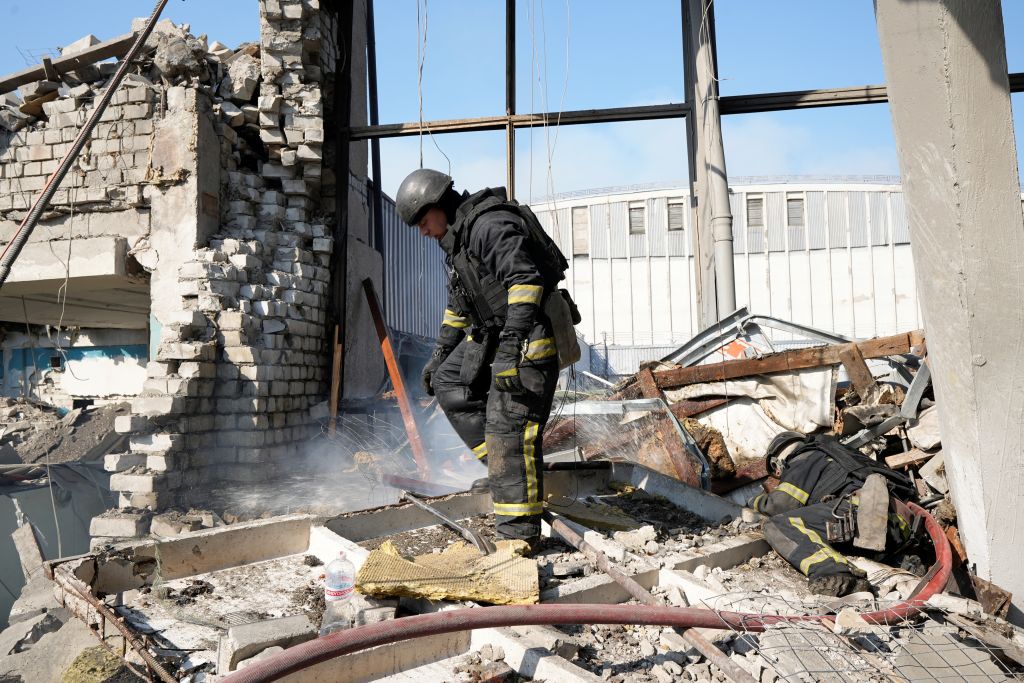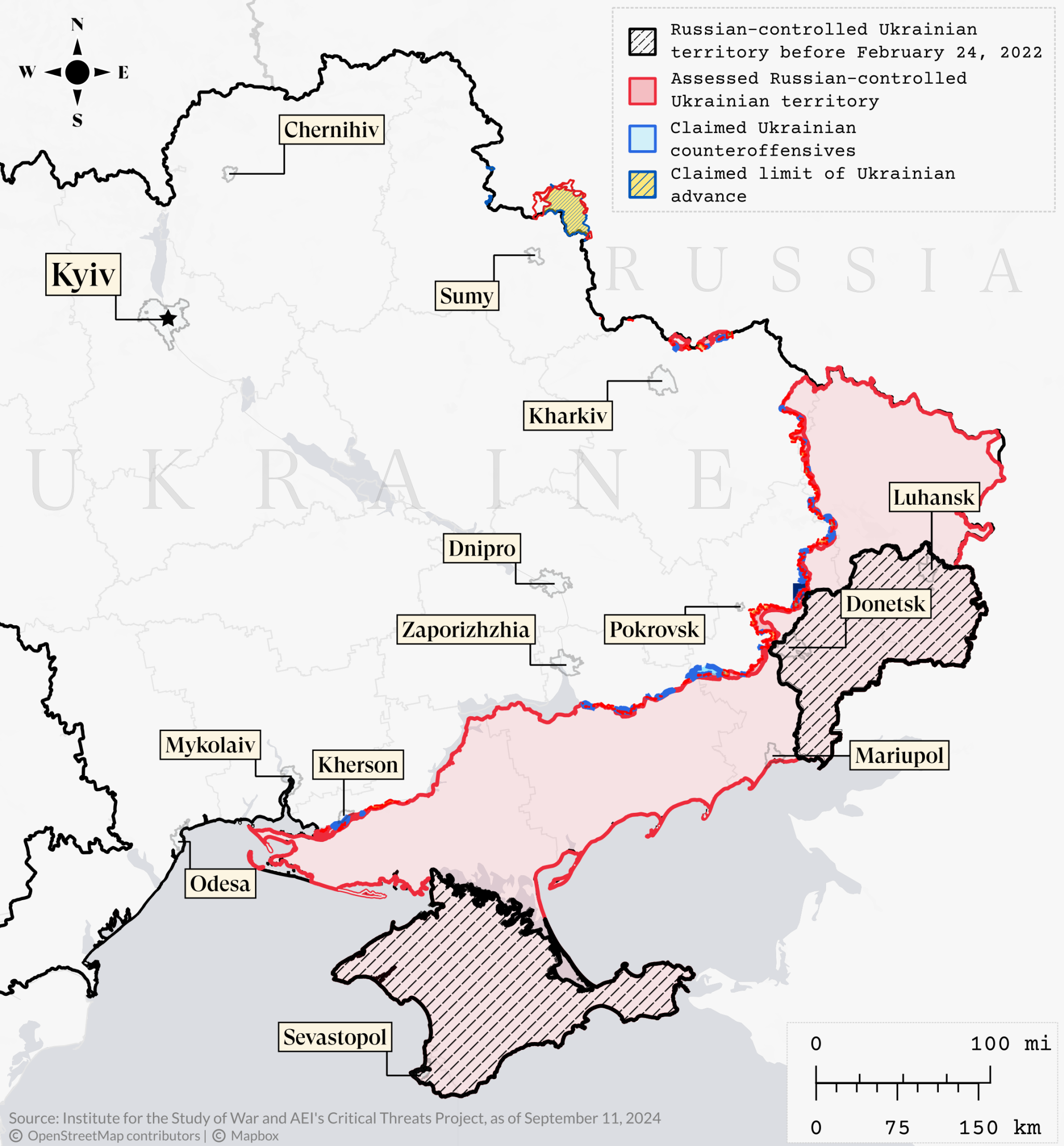Gift this article

Use the options below to copy or email a special link so that friends or family can access this article without a subscription.
Happy Thursday! We had the “concepts of a plan” for today’s intro joke, but they never quite made it beyond that stage.

Millions of Americans tuned in on Tuesday night to watch the first, and perhaps only, debate face-off between former President Donald Trump and Vice President Kamala Harris before the November presidential election.
But it surely wasn’t just potential voters trying to take the measure of the two candidates asking to become the most powerful person in the world. Indeed, for leaders in capitals across the globe, the debate was a crucial window into what U.S. foreign policy might look like under either a Trump or Harris administration.
And Ukrainian President Volodymyr Zelensky may not have liked what he heard.
“Do you want Ukraine to win this war?” moderator David Muir asked Trump just over an hour into the debate. In response, Trump meandered, lambasting Europe and the Biden administration. “That is a war that’s dying to be settled,” he said. “I will get it settled before I even become president.”
But Muir pushed: Is it in the U.S. interest for Ukraine to win? “It’s in the U.S. best interest to get this war finished and just get it done,” Trump responded.
“Settled” or “finished,” in this context, seems to assume a desire on the part of Russia to stop its invasion, and there are no indications Russian President Vladimir Putin is interested in letting up on the gas. As the Russian military continues to wear down Kyiv’s air defenses and make gains near a key Ukrainian logistical hub, the Kremlin is getting even more support from its allies in Tehran and Beijing. Ukraine, for its part, continues to press its allies to lift restrictions on the use of long-range weapons systems against Russian targets as U.S. Secretary of State Antony Blinken and U.K. Foreign Secretary David Lammy visited Kyiv on Wednesday following a significant reshuffling of Zelensky’s Cabinet more than two-and-a-half years into the war.
Even after Ukraine seized—and is now defending—a significant swath of Russian territory in the Kursk oblast in an offensive last month, Russia has continued making consistent gains around the Ukrainian logistical hub of Pokrovsk, a city important for Kyiv both tactically and symbolically. To lose it, for example, would be a blow to morale and potentially compromise rail lines and roadways throughout the eastern Donbas region. Ukraine has sent additional troops to the area in recent days, but Russian forces seem to be on a path to encircle Ukraine’s forces southeast of the city. “We are exchanging lives and territory for time and the opponent’s resources,” one Ukrainian officer told The Economist of the state of the battle.

Meanwhile, Russia is getting a little help from its friends, as U.S. officials revealed this week that Iran has supplied Moscow with short-range ballistic missiles and that China—which had previously provided mostly dual-use material and technology in support of Russia’s war—is now providing more direct support to the Russian military in exchange for access to military technology. “These are not dual-use capabilities,” U.S. Deputy Secretary of State Kurt Campbell said Tuesday. “These are basically being applied directly to the Russian war machine.”
Tehran had previously provided Russia with its Shahed drones, and helped the Russian government build the drones itself in Russia, using them to serious effect on cities and infrastructure across Ukraine. “These are propeller driven, like propeller driven airplanes, slow and relatively easy to shoot down, whereas ballistic missiles go up in the air and come down at a much higher rate of speed and therefore [are] harder to shoot down,” Mark Cancian, senior adviser at the Center for Strategic and International Studies, told TMD of the difference between the Iranian drones and ballistic missiles. Russia has also used its own ballistic missiles in aerial attacks on Ukraine, but only as many as it could “scrape together” in a month, he said.
In response to Iran’s provision of missiles, the U.S. slapped sanctions on several Iranian entities and European allies halted direct flights to Tehran. Still, Blinken said Tuesday, “Russia has now received shipments with these ballistic missiles, and will likely use them within weeks in Ukraine, against Ukraine.” Only the coveted and hard-to-come-by Patriot air defense systems are sufficient to shoot down the ballistic missiles, meaning additional stocks of missiles could get through Ukrainian defenses.
The takeaway, though, is that “the United States’ adversaries are growing closer and closer together,” said Raphael Cohen, a senior political scientist at RAND Corporation who’s also a colonel in the U.S. Army Reserves. “There may not be an ‘axis of evil’ in the full-blown sense—there’s no evil headquarters out there—but nonetheless, the interconnections between the United States’ named adversaries are increasing.”
In another example of this linkage, Russia and China launched massive joint war games on Tuesday, the largest of their sort in 30 years. “We pay special attention to strengthening military cooperation with friendly states,” Putin said Tuesday. “Today, in the context of growing geopolitical tensions in the world, this is especially important.”
But Ukraine has friends, too. Blinken and Lammy spent Wednesday in Kyiv meeting with Ukrainian officials where requests for the Western allies to lift restrictions on the use of long range weapons on targets in Russia were surely front-and-center. The West has put geographic restrictions on how deep into Russian territory the Ukrainians may strike with western long-range missiles, though President Joe Biden hinted at plans to change the policy, saying on Tuesday that his administration was “working on that now.” Lawmakers from both parties pressed the Biden administration this week to remove the limits on Ukraine’s use of the weapons.
Lammy and Blinken are reportedly seeking plans from Ukrainian officials about how they would deploy the long-range Army Tactical Missile Systems (ATACMS) and British Storm Shadow missiles if the U.S. and the U.K. changed their policy. “One of the purposes of the trip that we’ll be taking together is to hear directly from the Ukrainian leadership,” Blinken said Tuesday on the question of the restrictions. “All I can tell you is we’ll be listening intently to our Ukrainian partners.”
“The U.S. and U.K. will likely be pushing to have the targeting limited to military targets, [and] want assurances they won’t be fired at civilian targets or places where there could be a lot of civilian casualties,” Cancian predicted. “I suspect also they may restrict them from being used against infrastructure, so not against the electrical grid, not against refineries, which the Ukrainians have been doing.” Ukraine has targeted oil refineries in Russia with its own domestic capabilities, over U.S. objections.

The U.S. officials arrived following one of the most significant Cabinet reshuffles for Zelensky since the beginning of the war. Nine new ministers took office last week, including a new foreign minister, Andrii Sybiha, who’s a career diplomat and former adviser to Zelensky.
The reshuffle shouldn’t necessarily be cause for alarm, though, considering how demanding the jobs are even in peacetime, Cohen told TMD. “The changes at the top, I think, are reflective of the fact that Zelensky is still settling on what the ultimate direction and way ahead is going to be,” said Cohen, “and so he’s reshuffling his team accordingly.” Zelensky said Wednesday he will present his plan for victory during a trip to the U.S. later this month that could have a “psychological” effect on Putin sufficient to bring him to the negotiating table.
Ukraine has faced a dip in morale as the war has dragged on and as the army struggles with desertion and recruitment. The Kursk operation seemed to help, providing the most encouraging news in months and changing the defeatist narrative that had begun to take hold.
“People are tired, and you see it in their faces,” said Cohen, who visited Ukraine last month and spoke to dozens of people in the national security space. “It’s two-and-a-half years of war. If you go to Kyiv you get air raid alerts every night and that takes a toll on people.”
“At the same time, you know, everyone is acutely aware of the stakes here,” he added. “This is an existential struggle for them. So while they are tired, they are also keenly aware of what happens if you stop fighting.”
Mediaite: Elon Musk Offers to Impregnate Taylor Swift: ‘I Will Give You a Child’
Mediaite: Dave Rubin Urges ‘Young Pretty Girl’ Taylor Swift to Reconsider Harris Endorsement Because Venezuelan Gangs Might Rape or Kill Her
The Hill: Trump Floats Punishment For ABC After Debate
I mean, to be honest, they’re a news organization. They have to be licensed to do it. They ought to take away their license for the way they did that.
National Review: Travelers File Class-Action Suit Against Anti-Israel Activists Who Organized Chicago Airport Traffic Blockade
The Apprentice featuring Donald Trump is returning—well, sort of. In October, Sebastian Stan will star as a young Trump at the outset of his business career. It’s surely one of many films we’ll get about the most dominant political figure of a generation, so let the games begin.
Will you watch the Trump biopic—and the inevitable future fictionalized accounts of his life and presidency?